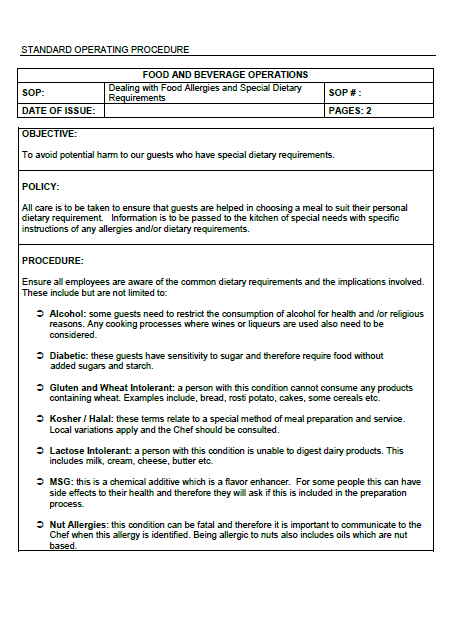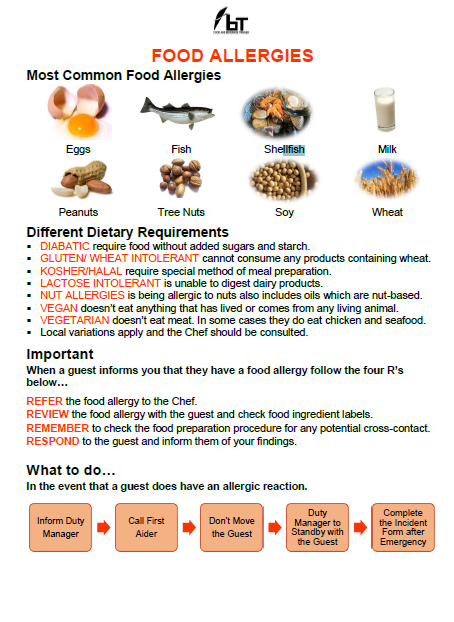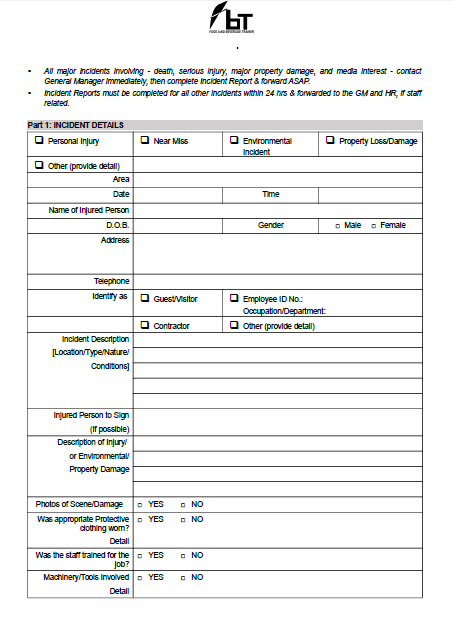Free New trainings added for subscribers “Food Allergies Awareness”.
Includes:
- SOP Dealing with Food Allergies and Special Dietary
- Food Allergies Poster
- Incident Report Form
To access these materials simply log in to your free training page.
SOP Dealing with Food Allergies and Special Dietary Requirements
[/ezcol_1third]
Food Allergies Awareness Poster
[/ezcol_1third]
[ezcol_1third_end]
Incident Report Form
[/ezcol_1third_end]
Not yet a subscriber sign up here
Better training for restaurant staff may prevent allergy deaths
by lmcleod
Allergy Research, Industry News
In the United States, between 150 and 200 people die each year as a result of food allergies. Nearly half of reported fatal food allergy reactions over a 13-year period were caused by food from a restaurant or other food service establishment. A recent survey of restaurant staff has highlighted a need for improved training and practices to protect food allergic diners.
During January 2014–February 2015, a collaborative forum of US federal agencies and state and local health departments interviewed staff at 278 restaurants across six sites (California, Minnesota, New York, New York City, Rhode Island, and Tennessee), to ascertain the prevalence of food allergy training, training topics, and practices related to food allergies.
Less than half of the 277 restaurant managers (44%), 211 food workers (41%), and 156 servers (33%) interviewed reported receiving food allergy training. Among those who reported receiving training, topics commonly included how to prevent allergen cross-contact, the major food allergens and what to do if a customer has a food allergy.
Fewer participants reported that training covered menu items containing food allergens, symptoms of an allergic reaction, and what to do if a customer has a serious allergic reaction.
The 2013 Food and Drug Administration Food Code states managers are responsible for ensuring employees are properly trained in food safety, including food allergy awareness. In addition, the organization Food Allergy Research & Education (FARE) encourages food allergy training for all new restaurant employees before they begin serving patrons, and periodic training updates for current staff members. However, the findings of this latest survey indicate that employee training is not occurring according to recommendations.
The study authors conclude restaurants can improve safety for food allergic patrons by providing food allergy training for personnel; ingredient lists for all menu items; and by dedicating equipment and areas specifically for preparing allergen-free food.
Reference: Radke et al. 2017. Morbidity and Mortality Weekly Report Vol. 66(15):404-407. doi: 10.15585/mmwr.mm6615a2. This paper is Open access.
In Australia, the National Allergy Strategy is addressing ‘Allergy management in food service including in the hospital setting’. The National Allergy Strategy food service project aims to help the food service sector to cater for individuals with food allergies understanding that both the customer and food service staff have responsibilities.




